How Do You Make A Website Secure
Themeisle content is free. When you buy through referral links on our site, nosotros earn a committee. Larn More than
When people enquire me how to secure a website with 100% certainty, I tell them it's simple: just keep it offline.
Once they finish yelling at me, they'll usually shift the conversation towards website builders and content management systems (CMS) to find out which pick has the all-time security.
What they don't sympathize is, it doesn't matter whether you utilize a website builder for your blog, or a CMS to power your business concern; at that place'south always going to exist an chemical element of risk.
The real problem with that is, the responsibility for managing that take chances is yours. If that wasn't bad plenty, things could go incorrect if you try to do it all yourself. Really fast.
That's why, in this article, I'grand sharing my top-drawer tips for keeping a website secure. Don't worry; these aren't the kind of tips you need a Ph.D. to implement.
They're simple, valuable strategies yous tin implement in the course of an afternoon. Ameliorate yet, they work. No thing which approach you lot take, each option has already earned its stripes in real-world battles against hackers and bots.
Let's get started!
How to secure a website: Pinnacle hazard-minimization strategies
There aren't many guarantees when it comes to securing a website. With no simple fix to proceed you rubber from hackers forever, your all-time shot is to implement these strategies to reduce vulnerabilities while increasing your chances of a quick recovery.
- Install an SSL document
- Implement multi-level login security
- Maintain a regular backup schedule
- Go along all software upward-to-appointment
- Employ a web application firewall (WAF)
- Be an constructive site administrator
- Stay alarm
one. Install an SSL certificate and use HTTPS everywhere
If yous're in the process of edifice your first website, yous might remember data encryption is 007 stuff that only big businesses or investigative journalists need.
But, if you plan to get traffic from Google, yous're also going to need an SSL certificate to get a decent ranking. Heck, you'll even need one to collect emails for a newsletter.
If this all seems like a bit much, keep in mind in that location are skillful reasons for all the cloak-and-dagger. In the past, whatsoever sensitive information your users sent to your server was in manifestly text. If anyone swooped up that data, they'd be able to read everything. That ways passwords, bank details, email addresses, everything.
An SSL certificate wraps all that sensitive data in a layer of encryption to make it impossible to read. Using an SSL document is the starting bespeak for having a secure website. Otherwise, your visitors run across this warning:
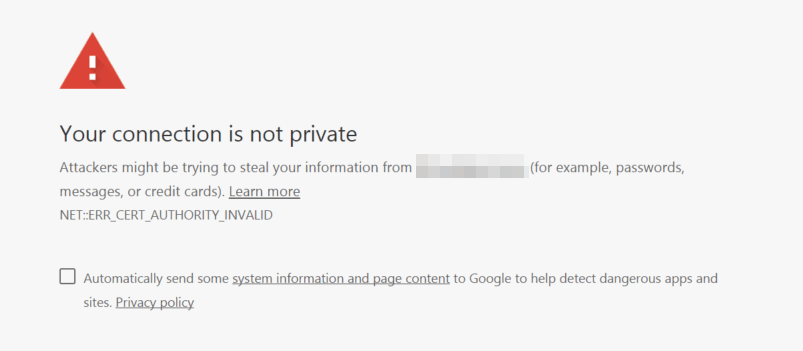
That'south why all the major website builders, like Wix and Squarespace, enable HTTPS by default for every website on their network.
For the residue of united states, getting an SSL document is easy.
Most web hosts nowadays offer simple tools to permit you install an SSL certificate with just a few clicks. If so, enquire them how to prepare it up. I'm sure it'south simple. Bluehost, for case, offers Let's Encrypt certificates bachelor correct in the control console.
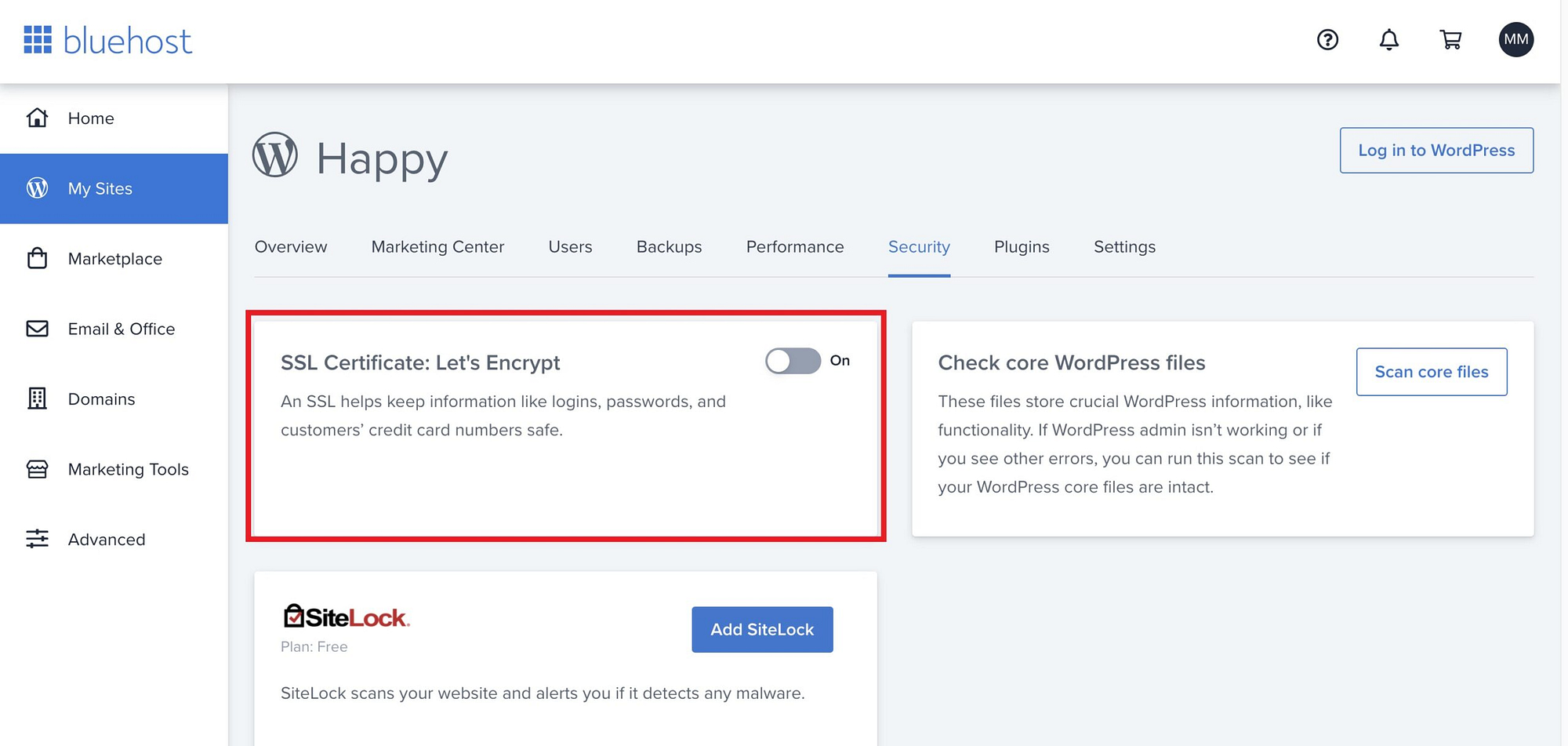
If your host doesn't offer a simple tool for some reason, you can too generate a free domain validation certificate from Let'due south Encrypt by following their guides. Once y'all're washed, caput to cPanel or your host'south custom dashboard to install information technology.
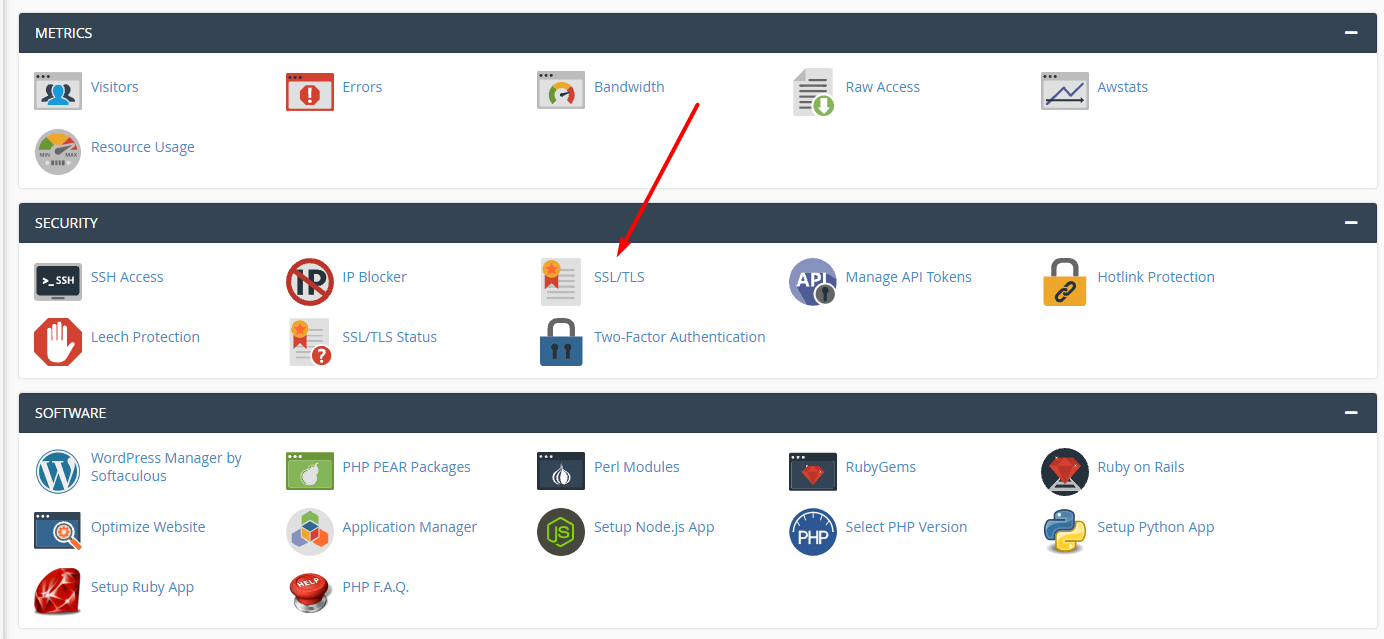
If you're on WordPress, you can utilise the Actually Uncomplicated SSL plugin to properly configure your site to employ the SSL certificate once yous've installed it:
ii. Secure your login folio and procedure
When it comes to login security, in that location's a lot of ground to cover. Only you can travel a long manner with just two elementary implementations: strong passwords and multi-cistron authentication.
That'south because strong login security is built on at to the lowest degree, two layers. For usa, information technology volition be something you know (stiff password) and something you have (code ship to e-mail, telephone, or call).
Potent passwords are fantastic; finer incommunicable to brute force and well-nigh incommunicable to judge.
Only beginning, do yourself a favor and take hold of a password director. For the past three years, I've been using 1Password, and it's been a game-changer. Why? Two reasons:
- The countersign and passphrase generator makes information technology easy to create (and regularly modify) passwords.
- With a password database, I was able to stop with all the "call back this password" and automated login business.
While all the in a higher place is cracking for taking intendance of your passwords, what about your users? I recommend using Password Policy Manager for WordPress to create enforceable strong password policies on WordPress sites.
Once you lot have a secure password, ready up multi-factor authentication logins. All this means is that someone volition need to enter a code, normally sent to a device, whenever they want to log in to your website.
Both Google Authenticator and Authy are easy to set up up on virtually website builders. For example, with Squarespace, you can observe the pick in the Settings.
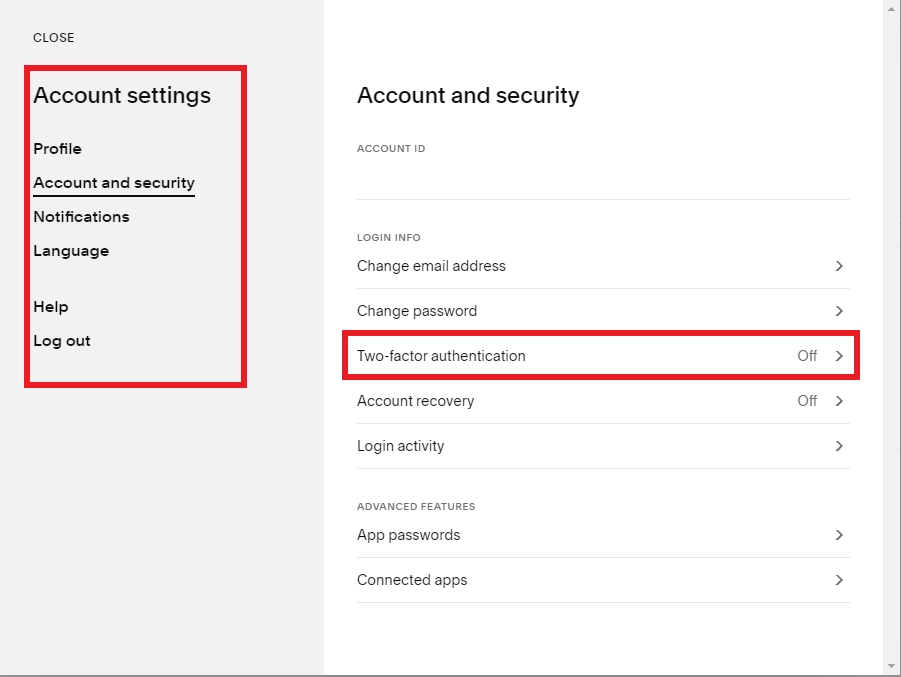
For WordPress, I can recommend Wordfence, but you could too use miniOrange'south Google Authenticator plugin.
We also have a guide on two-factor authentication for WordPress.
If you built something from scratch, you can apply Google's Identity Platform to integrate Google Authenticator with your website.
3. Back up your site regularly
Learning how to secure a website tin can exist as elementary equally creating a backup schedule.
You probably call back that no hacker has ever been scared off past a fill-in. And, yous'd exist correct; backups are a precautionary measure. Even so, they also requite you a safe place to recover from in a crisis. Each of the pop website builders has a different approach:
- Wix provides automatic weekly backups of your site.
- Shopify's popular Rewind app is one of a few backup apps.
- Squarespace has limited fill-in options ranging from creating a duplicated site to exporting the XML file.
- WordPress users can take advantage of any number of plugins designed to create safe backups.
For WordPress users, I recommend (and apply) UpdraftPlus. With the free version, you tin backup straight to the cloud, including Google Drive, Dropbox, Amazon S3, and more, without limitation. UpdraftPlus tin even help you restore your site in a crisis.
4. Go along all software upward-to-date
I'll be honest; I love tools like WordPress because themes and plugins brand everything easy. Do you want to showcase recipes on your website? There are probably a few hundred plugins built specifically for that purpose. It's not just WordPress; in Wix and Shopify, apps assistance you achieve a lot without typing a single line of code. Sounds great, correct? Kinda.
They as well make information technology hard to secure your lawmaking. Simply one poorly coded third-party production can increase the attack surface of your website. And, if you're not updating regularly, you lot're creating a lot of vulnerabilities.
Simply, y'all tin can reduce the vulnerabilities if you:
- Remove programs you don't use.
- Continually update programs you do apply.
- Only employ programs, plugins, and themes from developers who've proven they can maintain their products.
- Research whatever networks yous program to integrate with.
If you're using WordPress, yous'll get notifications in the dashboard when there's an update for the software itself and any themes and plugins you use. Y'all can also have advantage of the auto-update characteristic, which covers all of the above.
For the safest selection, check out a managed hosting program. Non but volition you savor hardened security, but yous'll also have someone handling the updates for your entire WordPress site. You can larn more almost managed WordPress hosting anytime you're ready for the leap.
v. Use a spider web application firewall (WAF) for proactive protection
If you want to secure a website with the ability of Arnold Schwarzenegger, get a web application firewall (WAF).
If you've used the internet in the last 25 years, and then you lot're familiar with firewalls. A web awarding firewall is similar to the firewall on your computer because it uses pre-defined rules to identify and cake attacks. This makes them particularly good for rooting out common attacks like cross-site-scripting (XSS), cantankerous-site forgery, and SQL injections, amongst others.
Even with the ever-changing threat horizon, a WAF is an essential tool. One thing you lot'll observe, most modern WAFs can modify and deploy rules rapidly as new vulnerabilities are discovered.
As the start line of defense, WAFs come in three master forms:
- Network-based backed past a hardware firewall – Hands the strongest firewall which you go from elite hosts like Kinsta and website builders similar Squarespace.
- Host-based – Covers any WAFs that are integrated into the awarding itself via a plugin or an app.
- Cloud-based – the most pop and easy-to-integrate security pick.
For WordPress users, Wordfence, over again, is probably the best solution.
six. Be an effective site administrator
As the administrator of a website, there are many fiddly things to track, but keeping on top of them will accept a pregnant touch on how secure a website is.
Let's take a quick await through them all:
- User roles: Go on track of user roles so you know who has access to information, who can make changes, and what other privileges they have. Only provide users with roles they need to complete their tasks. Anything more than that is a vulnerability.
- Monitor what users are doing and clean out inactive users: WP Action Log tin can help you lot rails the behavior of your users to baby-sit against malicious activity.
- Moderate all comments manually by removing automatic approvals.
- Decline any annotate that includes a link or code. While no longer mutual, malicious code in annotate sections was in one case a matter.
- Restrict the file types that tin can exist uploaded whether in comments or forms.
- Implement scanning and verification of whatever upload. Sucuri is the best selection for this.
7. Stay warning
If you lot've implemented the above solutions, y'all've already significantly reduced the set on surface hackers can apply to take over your site.
Nonetheless, if y'all program to keep it that way, you need to perform regular scans of your website and whatever external content yous publish on information technology, similar ads.
For example, protect confronting malvertising by working with trusted ad networks and scanning and testing all ad creatives earlier they go live on your site.
One of the market leaders, Sucuri SiteCheck, also happens to be free and will flag any viruses, malware, and malicious code that's affecting your site'south frontend.
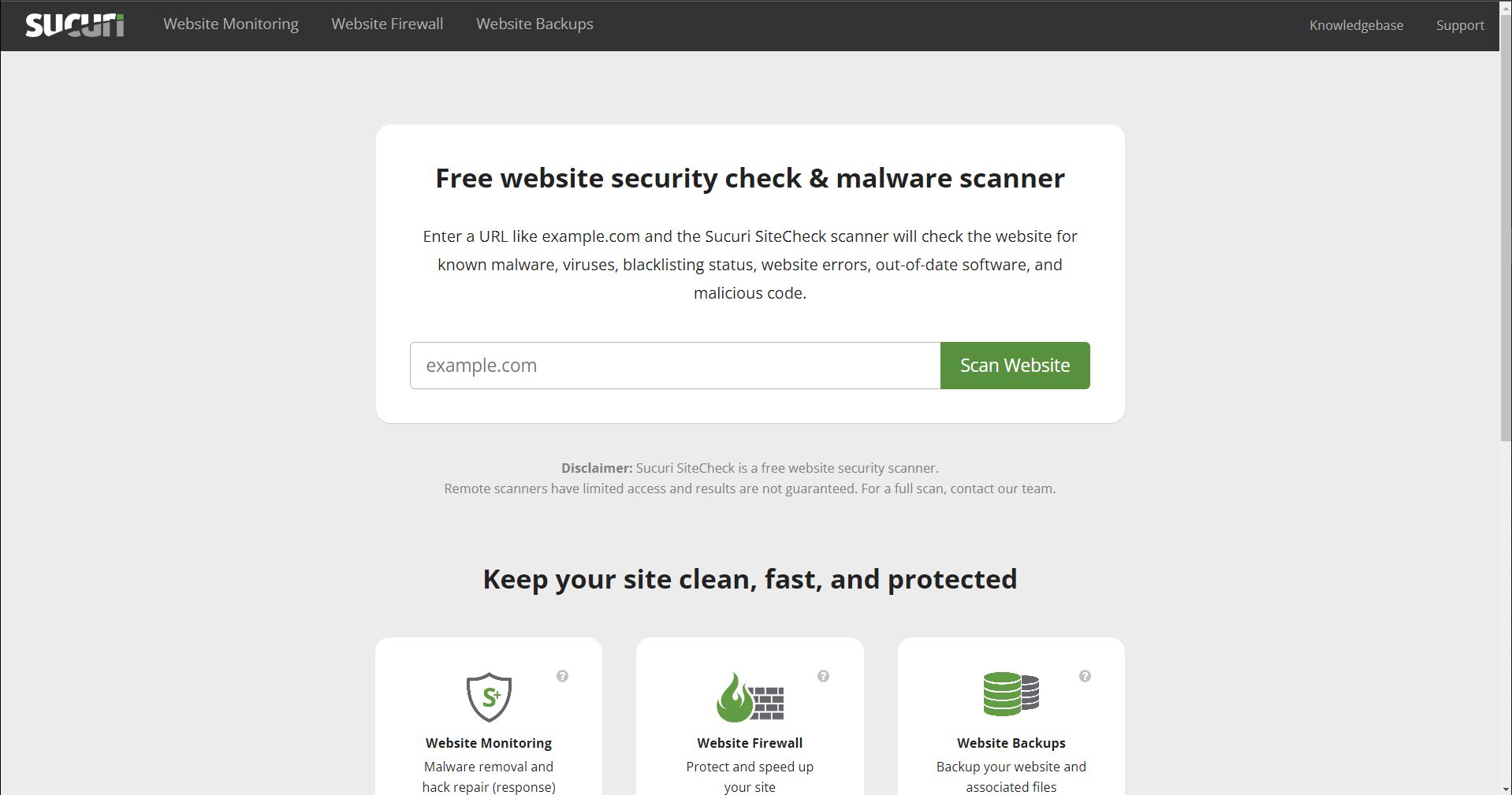
For mission-disquisitional sites, it would be all-time if you also created a regular security inspect incorporating a 2-layer arroyo:
Use penetration testing tools like the Pentest Tools website scanner to reveal the size of your attack surface. With over 25 different scanning tools, you lot'll uncover problems with your network, sensitive pages indexed past Google, and even the strength of your SSL connexion.
Perform vulnerability assessments crosschecked to a checklist that covers mutual security weaknesses:
- Regularly check for inactive plugins, themes, or other tertiary-party products.
- Confirm tools are updated with a recent update.
- Filters users by recent activity and consider removing inactive users.
- Build a list of users with special access like FTP admission and SSH access, and determine if they need and for how long.
These tactics might be overkill for a unproblematic hobby blog, just they tin can help you forestall issues on important sites.
Secure your website today!
If you're running a website, y'all're not but responsible for the security of your data only also for the data of your visitors, customers, and colleagues. Only, no pressure.
In the past, it might take seemed overwhelming to provide a secure website. But today? You don't need a huge budget or years of coding experience to secure a website and proceed your users safe.
In fact, with our 7-step risk minimization approach, you already know how to secure a website effectively:
- Install an SSL certificate
- Implement multi-level login security
- Maintain a regular backup schedule
- Go on all software up-to-date
- Use a spider web application firewall (WAF)
- Be an constructive site ambassador
- Stay alert
Practice you lot all the same have whatever questions about how to secure a website? Allow us know in the comments!
Free guide
5 Essential Tips to Speed Upwardly
Your WordPress Site
Reduce your loading time by even fifty-eighty%
just by following unproblematic tips.
Download gratuitous guide
Source: https://themeisle.com/blog/how-to-secure-a-website/
Posted by: jacquesdifewore1989.blogspot.com


0 Response to "How Do You Make A Website Secure"
Post a Comment